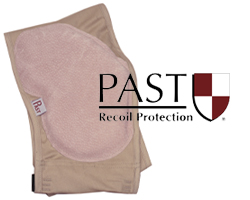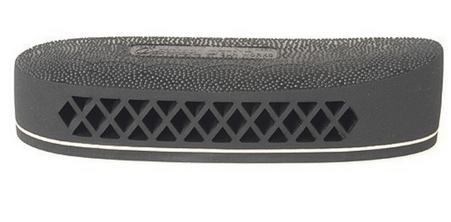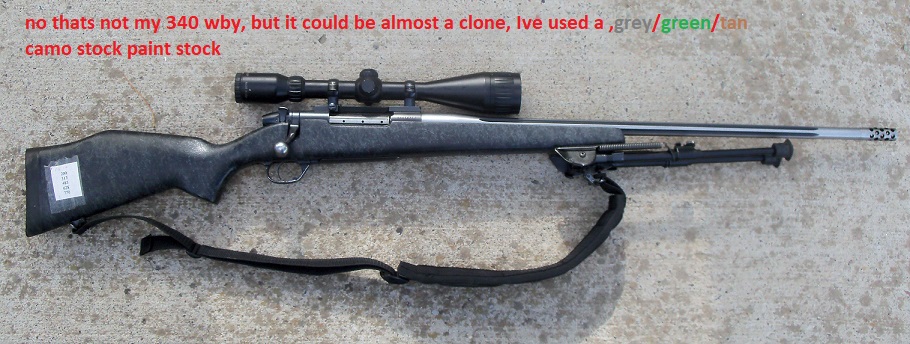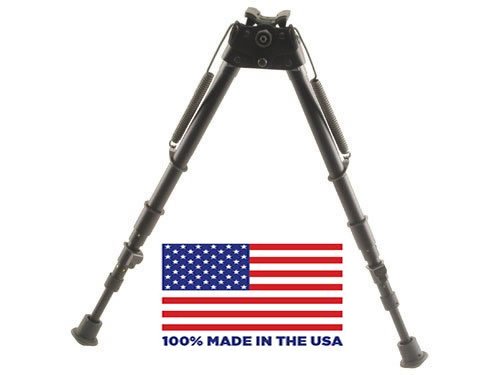we all know guys that have rifles that shoot tight groups, and guys thay get upset when they can,t shoot groups under 1" off the bench rest, but theres no bench rest in the field!
what I find amazing is the guys that work endlessly to shoot 1" or smaller groups of a bench rest, who then go hunting with the rifle ,never having practiced from field positions or with a sling, and then can,t understand why their 1" rifle can,t hit a deer at 100 yards to save their live,.
if you don,t know how to shoot from a standing or sitting position, or use a tree to help sturdy a site picture, without that darn bench rest,how in hell do you expect to hunt???
my 340 will shoot reasonably tight 1.2" groups off the bench, but with a bi-pod in the field a 2" groups fairly common, and theres no elk Ive ever seen that a rifle that shoots a 4"-5" group at 200 yards won,t kill
but Ive put up 10" diam. paper plates thumb tacked to the backers at 100 yard ranges for 30 plus years and placed a 2" orange dot on the center and used those as targets, for shooting off hand,and sitting, Ive had guys snicker when I hit just off the orange dot,firing almost as fast as I can work the action for three shots in practice and Ive yet to find one of the guys that was laughing that could keep all 3 quick shots anyplace on the plate, when challenged
a bench rest allows you to get the sights precise, but its a sling , and a bi-pod and the practice that results,in you becoming a decent shot, from the quickly acquired field positions you can actually use, in the field, and that constant practice, thats required to build that skill, means,you need and must have,spent a good deal of time shooting, to become proficient, that's mandatory, and its that constant practice, that makes it almost mandatory that you hand load with today's ammo cost
having a rifle thats able to shoot 1" groups of the bench is nice, but having the skill to use it to consistently shoot 2"-3" groups in the field at 100 yards is a far rarer skill
mentally step back and ask yourself ,
its the last day of the season, the biggest deer or elk you've ever seen is about to run,
over a ridge hes currently standing on,and it getting dark rapidly,
your only option is a raking shot angle,
whats the longest range, worst shot angle, your likely to ever be faced with,
will the rifle you carry easily allow you to drop game under that set of conditions?
if your one shot will be the only chance you get to fill your tag with the largest deer or elk youll ever see...
would you rather have a different rifle in your hands?
now realistically thats very likely to be at a range under 300 yards.
you'll have less than 6-10 seconds to make that shot, from a hasty field position,
and you will not have an ideal angle,
you may need to bust a lot of bone or punch a raking angle shot,
through a few feet or rump & guts to destroy the vitals.
if your smart you select a rifle and cartridge thats up to tackling the shot ,
under the most adverse conditions, not the ideal conditions
a 7.5 barrel 357 mag revolver loaded with a 158 grain soft point, will kill any deer or elk at 30 yards in skilled hands
a 243 with a premium 100 grain bullet is certainly lethal in skilled hand under close to ideal conditions
but what do you want if your only chance is about to disappear off that ridge at 300 yards, and his rump is almost 3/4 facing you as hes walking off that ridge crest?
personally I want a 270 win or 308 win as a minimum, and would be far happier with a 35 whelen, or 338 win.
I was at the local outdoor range rather briefly to check the zero on one of my rifles,
when the guy on the next bench started a conversation.
he was very sure to announce that he had purchased one of the newer short case 7mm magnums
he almost immediately wanted to discuss what he considered to be the best possible rifle and cartridge combo ,...
he was not having much luck setting his rifle zero
now if you've read many of my previous posts,
I've used about everything from a 44 mag marlin and a 357 mag revolver to a 458 lott on deer,
and I've seen elk consistently killed with a 257 Roberts and a 45/70 and most of the cartridges between the two.
there are no really bad 7mm magnum cartridges so if he learns to shoot consistently well he will be well armed.
and in my opinion, its much more important that the guy operating the rifle , know the games anatomy,
and fully understand the particular rifle or handguns strengths and limitations than the head stamp on the brass.
so I ask him to point out both what he expected the rifle to do,too the game being hunted,
and the conditions and ranges he expected it to function under, and pointed out that his selection should be fully capable,
of working under less than ideal ranges, shot angles on game and be reasonably accurate to the longest range he was likely to see or hunt game.
now theres thousands of articles written about the "best deer rifle" or "best elk rifle" every year.
news flash, theres hundreds of fully functional cartridge and rifle combos and there have been some available for over 100 years,
(30/06, 375 H&H,30/40 krag 6.5 mm swed,, 7mm mauser, 7.62.54r 8×64mm Brenneke, 303 brit, 333 jeffery, 470 nitro,405 win, 8mm mauser, 45/70 come instantly to mind)
if you read all the articles you would be sure to think, that only the newest and fastest, and flattest trajectory firearm would be up to the task.
funny how a 30/40 krag was used to kill one of the largest elk ever taken
https://throughahunterseyes.com/the-...c-proportions/
yes the rifle and cartridge matters, but its the skill , experience and knowledge of the guy holding it that matters far more
theres hundreds of thousands of good rifles and cartridges combos, but theres fewer really skilled hunters.
learn to use what you selected very well , to place accurate shots from field positions, and your odds of success skyrocket
most of us have been involved ,in these rifle/ammo choice selection discussions.
when I was younger and far less experienced , I was rather easily impressed, with isolated results I saw in the field.
after seeing 5 decades of game killed I think I gained a much more realistic perspective.
my mentors in the late 1960s and early 1970s almost exclusively suggested I buy and use a 30/06 loaded with peters 220 grain bullets.
as a group we hunted the area around EAGLE,MEEKER ,RIFLE and GYPSUM Colorado

I was not overly impressed with my first two elk kills using that combo, both elk were well hit at ranges under 150 yards
both ran, 40-60 yards on / after bullet impact
I swapped to a 340 weatherby using 250 hornady bullets and the next couple elk dropped within a few steps...
.I was convinced Id found the answer.
over the decades watching other guys use damn near every common cartridge,
it slowly dawned on me that damn near everything worked if the shot placement was good ,
and it was rather common for well hit elk to make a 30-50 yard run when hit.
my late hunting partner RON, used a 358 win BLR for decades and had good success,
another guy stuck to using a ruger #1 in 270 win with 150 grain speer bullets.. he was just as successful.
in over 28-29 individual out of state hunts I made, and 45 or so our group made,
our group did far better than the game department odds might suggest.
over time I watched the more experienced guys (other than myself) gravitate away from magnums,
the 30/06, 338/06 , 358 win and 35 whelen have become well respected choices
I stuck with the 340 wby and a 375 H&H carbine on most hunts
(hey I have 100% confidence in those)yes I tried a 358 win, a 30.06, a 270 win, 45/70, 450 marlin and Ive carried a 257 roberts,
they ALL work if you can shoot well.
its not the cartridge, or rifle or cartridge you select, (yes the projectile you use maters )
its your ability to find the elk,and get into decent range, and shoot accurately, thats critical.
looking at the guys that were consistently successful, it was dogged persistence, the ability to get your butt up before dawn and hunt until your successful
accumulated knowledge, learning how and why elk travel in , and avoid some areas that was the most critical skill
I may be wrong, but I've always assumed that most ethical and experienced, hunters will use and exercise,
reasonable judgement, before making a shot and only shoot under conditions they feel confident in making the shot well,
and have a respect for game, and have a solid grasp on their personal limitations.
I have also noticed as you stated that a good many people seem to think the rifles recoil level can be objectionable and that it effects their accuracy.
obviously thats a factor each of us has to deal with and tolerance differs wildly.
obviously no one can control others judgment, but felt recoil can be significantly reduced
use of a PAST recoil shoulder pad , a rifle stock recoil pad, and proper use of a sling and bi-pod goes a long way toward reducing the potential problem.

http://www.midsouthshooterssupply.com/i ... 0094310010


HB25CS 25C Model S -13.5-27" Swivel Bipod


read these
http://www.rifle-accuracy-reports.com/
http://www.huntingriflesreviews.com/whi ... ing-rifles
viewtopic.php?f=92&t=2370
http://www.chuckhawks.com/practical_accuracy.htm
http://www.rifleshootermag.com/shooting ... racy_1001/
what I find amazing is the guys that work endlessly to shoot 1" or smaller groups of a bench rest, who then go hunting with the rifle ,never having practiced from field positions or with a sling, and then can,t understand why their 1" rifle can,t hit a deer at 100 yards to save their live,.
if you don,t know how to shoot from a standing or sitting position, or use a tree to help sturdy a site picture, without that darn bench rest,how in hell do you expect to hunt???
my 340 will shoot reasonably tight 1.2" groups off the bench, but with a bi-pod in the field a 2" groups fairly common, and theres no elk Ive ever seen that a rifle that shoots a 4"-5" group at 200 yards won,t kill
but Ive put up 10" diam. paper plates thumb tacked to the backers at 100 yard ranges for 30 plus years and placed a 2" orange dot on the center and used those as targets, for shooting off hand,and sitting, Ive had guys snicker when I hit just off the orange dot,firing almost as fast as I can work the action for three shots in practice and Ive yet to find one of the guys that was laughing that could keep all 3 quick shots anyplace on the plate, when challenged
a bench rest allows you to get the sights precise, but its a sling , and a bi-pod and the practice that results,in you becoming a decent shot, from the quickly acquired field positions you can actually use, in the field, and that constant practice, thats required to build that skill, means,you need and must have,spent a good deal of time shooting, to become proficient, that's mandatory, and its that constant practice, that makes it almost mandatory that you hand load with today's ammo cost
having a rifle thats able to shoot 1" groups of the bench is nice, but having the skill to use it to consistently shoot 2"-3" groups in the field at 100 yards is a far rarer skill
mentally step back and ask yourself ,
its the last day of the season, the biggest deer or elk you've ever seen is about to run,
over a ridge hes currently standing on,and it getting dark rapidly,
your only option is a raking shot angle,
whats the longest range, worst shot angle, your likely to ever be faced with,
will the rifle you carry easily allow you to drop game under that set of conditions?
if your one shot will be the only chance you get to fill your tag with the largest deer or elk youll ever see...
would you rather have a different rifle in your hands?
now realistically thats very likely to be at a range under 300 yards.
you'll have less than 6-10 seconds to make that shot, from a hasty field position,
and you will not have an ideal angle,
you may need to bust a lot of bone or punch a raking angle shot,
through a few feet or rump & guts to destroy the vitals.
if your smart you select a rifle and cartridge thats up to tackling the shot ,
under the most adverse conditions, not the ideal conditions
a 7.5 barrel 357 mag revolver loaded with a 158 grain soft point, will kill any deer or elk at 30 yards in skilled hands
a 243 with a premium 100 grain bullet is certainly lethal in skilled hand under close to ideal conditions
but what do you want if your only chance is about to disappear off that ridge at 300 yards, and his rump is almost 3/4 facing you as hes walking off that ridge crest?
personally I want a 270 win or 308 win as a minimum, and would be far happier with a 35 whelen, or 338 win.
I was at the local outdoor range rather briefly to check the zero on one of my rifles,
when the guy on the next bench started a conversation.
he was very sure to announce that he had purchased one of the newer short case 7mm magnums
he almost immediately wanted to discuss what he considered to be the best possible rifle and cartridge combo ,...
he was not having much luck setting his rifle zero
now if you've read many of my previous posts,
I've used about everything from a 44 mag marlin and a 357 mag revolver to a 458 lott on deer,
and I've seen elk consistently killed with a 257 Roberts and a 45/70 and most of the cartridges between the two.
there are no really bad 7mm magnum cartridges so if he learns to shoot consistently well he will be well armed.
and in my opinion, its much more important that the guy operating the rifle , know the games anatomy,
and fully understand the particular rifle or handguns strengths and limitations than the head stamp on the brass.
so I ask him to point out both what he expected the rifle to do,too the game being hunted,
and the conditions and ranges he expected it to function under, and pointed out that his selection should be fully capable,
of working under less than ideal ranges, shot angles on game and be reasonably accurate to the longest range he was likely to see or hunt game.
now theres thousands of articles written about the "best deer rifle" or "best elk rifle" every year.
news flash, theres hundreds of fully functional cartridge and rifle combos and there have been some available for over 100 years,
(30/06, 375 H&H,30/40 krag 6.5 mm swed,, 7mm mauser, 7.62.54r 8×64mm Brenneke, 303 brit, 333 jeffery, 470 nitro,405 win, 8mm mauser, 45/70 come instantly to mind)
if you read all the articles you would be sure to think, that only the newest and fastest, and flattest trajectory firearm would be up to the task.
funny how a 30/40 krag was used to kill one of the largest elk ever taken
https://throughahunterseyes.com/the-...c-proportions/
yes the rifle and cartridge matters, but its the skill , experience and knowledge of the guy holding it that matters far more
theres hundreds of thousands of good rifles and cartridges combos, but theres fewer really skilled hunters.
learn to use what you selected very well , to place accurate shots from field positions, and your odds of success skyrocket
most of us have been involved ,in these rifle/ammo choice selection discussions.
when I was younger and far less experienced , I was rather easily impressed, with isolated results I saw in the field.
after seeing 5 decades of game killed I think I gained a much more realistic perspective.
my mentors in the late 1960s and early 1970s almost exclusively suggested I buy and use a 30/06 loaded with peters 220 grain bullets.
as a group we hunted the area around EAGLE,MEEKER ,RIFLE and GYPSUM Colorado

I was not overly impressed with my first two elk kills using that combo, both elk were well hit at ranges under 150 yards
both ran, 40-60 yards on / after bullet impact
I swapped to a 340 weatherby using 250 hornady bullets and the next couple elk dropped within a few steps...
.I was convinced Id found the answer.
over the decades watching other guys use damn near every common cartridge,
it slowly dawned on me that damn near everything worked if the shot placement was good ,
and it was rather common for well hit elk to make a 30-50 yard run when hit.
my late hunting partner RON, used a 358 win BLR for decades and had good success,
another guy stuck to using a ruger #1 in 270 win with 150 grain speer bullets.. he was just as successful.
in over 28-29 individual out of state hunts I made, and 45 or so our group made,
our group did far better than the game department odds might suggest.
over time I watched the more experienced guys (other than myself) gravitate away from magnums,
the 30/06, 338/06 , 358 win and 35 whelen have become well respected choices
I stuck with the 340 wby and a 375 H&H carbine on most hunts
(hey I have 100% confidence in those)yes I tried a 358 win, a 30.06, a 270 win, 45/70, 450 marlin and Ive carried a 257 roberts,
they ALL work if you can shoot well.
its not the cartridge, or rifle or cartridge you select, (yes the projectile you use maters )
its your ability to find the elk,and get into decent range, and shoot accurately, thats critical.
looking at the guys that were consistently successful, it was dogged persistence, the ability to get your butt up before dawn and hunt until your successful
accumulated knowledge, learning how and why elk travel in , and avoid some areas that was the most critical skill
I may be wrong, but I've always assumed that most ethical and experienced, hunters will use and exercise,
reasonable judgement, before making a shot and only shoot under conditions they feel confident in making the shot well,
and have a respect for game, and have a solid grasp on their personal limitations.
I have also noticed as you stated that a good many people seem to think the rifles recoil level can be objectionable and that it effects their accuracy.
obviously thats a factor each of us has to deal with and tolerance differs wildly.
obviously no one can control others judgment, but felt recoil can be significantly reduced
use of a PAST recoil shoulder pad , a rifle stock recoil pad, and proper use of a sling and bi-pod goes a long way toward reducing the potential problem.

http://www.midsouthshooterssupply.com/i ... 0094310010


HB25CS 25C Model S -13.5-27" Swivel Bipod

read these
http://www.rifle-accuracy-reports.com/
http://www.huntingriflesreviews.com/whi ... ing-rifles
viewtopic.php?f=92&t=2370
http://www.chuckhawks.com/practical_accuracy.htm
http://www.rifleshootermag.com/shooting ... racy_1001/
Last edited by a moderator:


